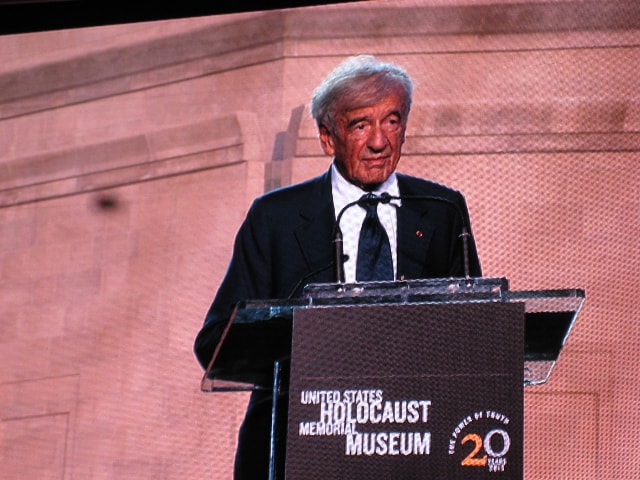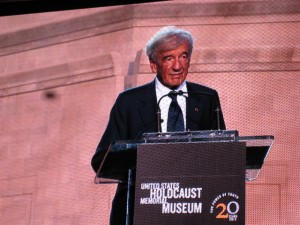At a tribute dinner on Sunday, April 28 in Washington DC, I sat with Holocaust Commission members Deb Segaloff and Marilyn Ashe, and her husband Michel, a child survivor from Paris, and applauded the presentation of this year’s U.S. Holocaust Memorial Museum Elie Wiesel Awards to those who best exemplify the museum’s motto, “What You Do Matters.”
Founding Chairman Elie Wiesel emphasized to those assembled the museum’s importance. “The end of the story is written by us, not by destiny,” he stated. “We decide what to do with our memories.” Accepting an award via video from Poland on behalf of all rescuers of Jews during the Holocaust was Wladyslaw Bartoszewski, a Polish leader in the Zegota (Council for Aid to Jews) who provided assistance during the Warsaw Ghetto uprising and relayed vital information to the Polish government in exile. This 93-year-old was matter-of-fact about what he did during the war. He made dangerous choices at the time because they represented “the right thing to do.”
Accepting an award on behalf of all World War II veterans was Susan Eisenhower, granddaughter of President Dwight D. Eisenhower. Then General Eisenhower, upon witnessing the liberation of the Ohrdruf Concentration Camp, stated, “I felt it my duty to be in a position from then on to testify firsthand about these things, in case there ever grew up at home the belief or assumption that the stories of Nazi brutality were just propaganda.” Eisenhower praised her grandfather’s foresight, and the mission of the museum, noting the proliferation of Holocaust denial today.
The dinner kicked off the museum’s 24-hour 20th Anniversary celebration, dedicated to the survivors and the World War II veterans who were their liberators. Museum leadership wanted to hold the event in 2013, knowing that by their 25th anniversary in 2018, there will be far fewer of these survivors and heroes around to participate.
Monday morning, just as he had done 20 years earlier at its opening, President Bill Clinton addressed a drizzle-dampened crowd, and spoke of the importance of the national treasure that is the United States Holocaust Memorial Museum. In addressing more than 3,500 people, including 875 survivors and 140 World War II veterans, Clinton said, “Of all the monuments in Washington—the Lincoln Memorial, the Washington Monument, the Vietnam War Memorial, on down the line—this Museum is our Conscience.”
Luckily, instead of being windblown on the mall, this year the attendees had the luxury of a comfortable tent behind the museum with big screens set all around. Colors were paraded of every military unit that fought in WWII, and many of their ranks were in attendance, some even in their old uniforms! Eighty-seven-year-old Virginia Beach veteran Bill Jucksch, whose 71st Infantry unit liberated Gunskirchen death camp, was there with his wife Terry, sitting with the family of Simon Braitman, a prisoner whom he’d freed from the camp.
President Clinton recalled that he said at the museum’s opening, “no matter how smart a people is, if you have a head without a heart, you’re not human.” He reminded those gathered that it was his friend Elie Wiesel who told him not to make the mistakes of his predecessors when it came to countries violating human rights. He noted the sweet irony that it was Jews of conscience like Wiesel who led the drive to save the lives of European Muslims in Kosovo.
Wiesel also spoke on Monday, as did the museum’s long-time director, Sara Bloomfield, and its president, Tom Bernstein, who articulated that, “All actions have consequences, as do inactions.” Two museum activists spoke, one the grandchild of survivors, one an African American woman who was inspired by the museum as a student and made Holocaust education her personal mission, becoming a teacher out of college and then coordinator of leadership programs at the museum.
There were informative seminars throughout the day in the museum, as well as access to its newest exhibit, Some Were Neighbors: Collaboration and Complicity in the Holocaust. One of the seminars on saving Holocaust artifacts focused on the recent donation of a letter written by Vilma Grunwald. The woman penned this letter to her husband Kurt as she was on her way to the gas chambers in Auschwitz with their disabled son, whom she did not want to die alone. She charged Kurt with looking after their other son, Frank, their “Golden Boy.” Frank, who found that letter only after his father passed away, was Tidewater’s Yom Hashoah speaker this year. The letter he donated, and all of his stories, are detailed in the 2012 awardwinning documentary film, Misa’s Fugue. (available online or through the Holocaust Commission).
Joining their Holocaust Commission colleagues for Monday’s events were Alicia Friedman, Anne Fleder, Mickey Held, Elise Berkowitz, and Betsy Karotkin. We spotted local survivor Dr. Ludwig Sternlicht in the crowd, and also met up with Rachel Becker, granddaughter of local survivor Hanns Loewenbach, of blessed memory. Becker volunteers at the USHMM. Community members Joseph and Lynn Familant were also there for the events, and our “delegation” met up with our community’s 2011 Yom Hashoah speaker, Ruth Hartz, who came from her home in Pennsylvania.
What We Carry chair, Mickey Held, felt inspired to witness the humility of the survivors, rescuers, and liberators present, and proud of the Holocaust Commission’s dedication to perpetuating the memory while teaching the Holocaust’s lessons. Betsy Karotkin loved seeing “how the museum is using memory to ‘change the world’ one visitor at a time. It is a place where Truth abides, reminding us of the evil and good that resides in each of us.” For Alicia Friedman, the “emotion of being surrounded by our country’s cherished survivors, Elie Wiesel, and Bill Clinton, made it very clear that this [day] was an indelible mark on life’s history lesson.”
It was a wonderful tribute, and one that none who were there will soon forget.
by Elena Barr Baum


